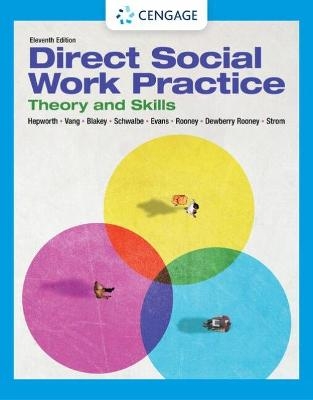
Empowerment Series
Brooks/Cole (Verlag)
978-0-357-63059-4 (ISBN)
Ronald Rooney is a professor emeritus in the School of Social Work at the University of Minnesota. As a former social worker in child welfare, community mental health and school social work, Dr. Rooney is also the author of Strategies for Work with Involuntary Clients. Highly respected social work educators, Dean H. Hepworth and Jo Ann Larsen originally defined how direct practice should be taught. Glenda Dewberry Rooney is a professor emeritus in the Department of Social Work at Augsburg University in Minneapolis. She taught undergraduate and graduate practice courses in ethics, and research and courses in organizations and administration. Her practice experience includes child welfare, mental health and work with families and children. In addition, she was involved in community-based research and worked with agencies concerned with children, youth and families as a trainer and as a clinical, program and management consultant. Kim Strom is the Smith P. Theimann Jr. Distinguished Professor of Ethics and Professional Practice in the School of Social Work and director of the university’s Office of Ethics and Policy. She also serves as the principal investigator of the UNC School of Social Work state behavioral healthcare contract. Dr. Strom has been an educator for over 30 years and has authored over 80 books, articles and chapters on ethics and practice. She is an internationally recognized scholar on moral courage, ethics and social work education. In addition, she served on the NASW committee responsible for revising the Code of Ethics and represents North America on the Ethics Commission of the International Federation of Social Work. Pa Der Vang, Ph.D., MSW, LICSW, is an associate professor at St. Catherine University in the Department of Social Work. She teaches social work methods with individuals, groups and communities; human behavior in the social environment; group work; and communication and interviewing skills. Dr. Vang’s publications center on Hmong immigration and culture change. She co-founded the Minnesota Hmong Social Workers’ Coalition and serves on the Minnesota Board of Social Work. She is also editor of Staring Down the Tiger: Stories of Hmong American Women (Minnesota Historical Society Press, 2020). Joan Marie Blakey, PhD, LMSW, is an associate professor in the School of Social Work at Tulane University. Before her administrative role as the associate dean of academic affairs, Dr. Blakey taught generalist micro practice and direct practice and children and families at the Master of Social Work (MSW) level. She also has developed several courses related to trauma, substance abuse and co-occurring disorders, and she teaches doctoral-level courses. Dr. Blakey’s scholarly research interests and practice experiences primarily involve trauma and substance abuse among African American women involved with the child protection and criminal justice system. More recently, her research and consulting work has focused on organizational and structural assessments and evaluations related to racial equity. Dr. Blakey also serves on the Council on Social Work Education and the Black Administrators, Researchers and Scholars’ Board of Directors. Craig Schwalbe, Ph.D., MSW, is a professor in the Columbia University School of Social Work. Prior to joining the School of Social Work, he was in direct practice in child welfare, child mental health and adult mental health settings in rural communities. Dr. Schwalbe’s current scholarship focuses on the development of evidence-based strategies for probation-involved adolescents. He was the recipient of the WT Grant Foundation Scholars award in 2009, which funded a study of success and failure on probation, and he led a UNICEF-funded international development effort to design and implement juvenile diversion programs for delinquent youths in Jordan. Most recently, he is a co-principal investigator of the COVID-19 Community Supervision Survey, which seeks to explore how probation and parole have adapted to the COVID-19 pandemic. Caroline Evans is currently the lead evaluator for the Substance Use Prevention, Education and Research (SUPER) project, an adolescent substance use prevention program in North Carolina. Dr. Evans' research focuses on adolescent development, youth violence, bullying and victimization, adolescent substance use prevention and anti-racism and social justice. Her clinical experience includes working with Latinx clients in both community mental health and hospital settings.
Part I: INTRODUCTION.
1. The Challenges of Social Work.
2. Orienting Frameworks for Direct Practice.
3. Overview of the Helping Process.
4. Operationalizing the Social Work Values and Ethics.
Part II: EXPLORING, ASSESSING, AND PLANNING.
5. Building Blocks of Communication: Conveying Empathy and Authenticity.
6. Verbal Following, Exploring and Focusing Skills.
7. Eliminating Counterproductive Communication Patterns.
8. Assessment: Exploring and Understanding Problems and Strengths.
9. Assessment: Intrapersonal, Interpersonal and Environmental Factors.
10. Assessing Family Functioning in Diverse Family and Cultural Contexts.
11. Forming and Assessing Social Work Groups.
12. Developing Goals and Formulating a Contract.
Part III: THE CHANGE-ORIENTED PHASE.
13. Choosing and Implementing Interventions to Facilitate Change.
14. Balancing Micro and Macro Social Work Practice: Roles, Theories and Intervention Strategies.
15. Enhancing Family Functioning and Relationships.
16. Intervening in Social Work Groups.
17. Additive Empathy, Interpretation and Confrontation.
18. Managing Barriers to Change.
Part IV: THE TERMINATION PHASE.
19. The Final Phase: Evaluation and Termination.
| Erscheinungsdatum | 09.05.2022 |
|---|---|
| Verlagsort | CA |
| Sprache | englisch |
| Maße | 217 x 277 mm |
| Gewicht | 1043 g |
| Themenwelt | Sozialwissenschaften ► Pädagogik ► Sozialpädagogik |
| Sozialwissenschaften ► Politik / Verwaltung ► Politische Systeme | |
| Sozialwissenschaften ► Politik / Verwaltung ► Politische Theorie | |
| Sozialwissenschaften ► Soziologie | |
| ISBN-10 | 0-357-63059-9 / 0357630599 |
| ISBN-13 | 978-0-357-63059-4 / 9780357630594 |
| Zustand | Neuware |
| Haben Sie eine Frage zum Produkt? |
aus dem Bereich


